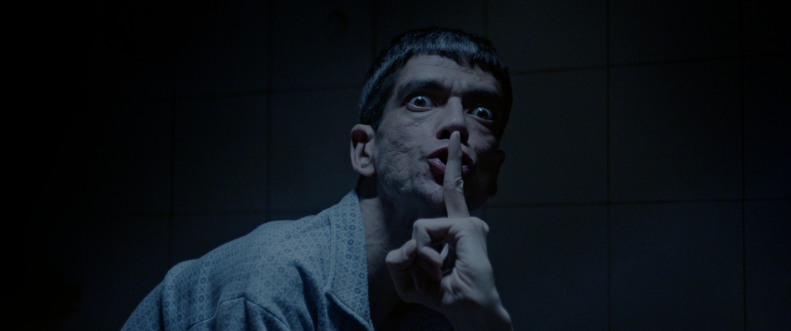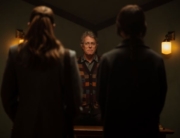How many chances do we have to put friendship to a test? That’s starting point of Amigo, where one friend, through sacrifice and devotion, cares for the other. Or that’s what it looks like initially when David (David Pareja) transfers his friend Javi (Javier Botet) to an isolated country house to look after him.
An unexplained accident left Javi in a wheelchair and paraplegic. He can barely move, and it takes enormous efforts for him to speak. His wife apparently died in the same accident, and he has no one else to care for him, except for the solicitous David, who somehow feels responsible for him. However, there’s more than good intentions in play here. The film marks the directorial debut of Óscar Martin, who presents a friendship story that progressively becomes a psychological horror tale that doesn’t take itself too seriously while making the most of the talents from his lead actors.
Is David a good friend or someone devoured by guilt? Or is it possible that he wants to “finish the job?” That’s what Javi later accuses him at times. Or is this the delusion of a convalescent man, understandably distressed? David is not hiding Javi from others, after all. A nurse visits regularly, and on one occasion, David brings a prostitute to animate his best friend. He also provides Javi with a little bell, encouraging him to ring it anytime—the sound of which will take on different meanings later on.
Peace doesn’t last long. David consumes mystery pills daily, but the incoming winter makes it impossible to get an instant delivery for more medication. Meanwhile, Javi’s not so veiled accusations increase threateningly, and each has the same fear of the other. You might think that Javi is in clear disadvantage, but many incidents (real or imagined) feeds David paranoia, like when a plugged-in hair dryer is dangerously placed next to a bathtub. He also has recurrent nightmares in which Javi looks like a monster from an old horror movie, not so different from the ones Javi watches on his bedroom TV. So, when David decides to install a hidden camera in Javi’s room, he observes the live feed fearfully, as if the black-and-white images will transform into a Hammer horror movie at anytime.
Amigo is the kind of playful film that pays direct homage to a certain type of cinema without revealing too much about its influences. It’s clearly inspired by What Ever Happened to Baby Jane? (1962), directed by Robert Aldrich, while at the same time positioning itself as an heir of a specific tradition of Spanish horror B movies by directors like Paul Naschy and Chicho Ibáñez Serrador, whose films Javi views in his room. What it shares with Aldrich’s film, besides the similarly obvious setup, is the idea of creating the perfect scenario for a physical and psychological acting duel. The great virtue of Amigo is Botet’s portrayal. The camera lingers on his emaciated and fragile body, yet he still has the intimidating charisma that has distinguished his tall and impressive figure in Mama, Crimson Peak, The Conjuring 2, and Slender Man.
The filmmaker seems more interested in taking the mantle from the old guard while respecting and honoring the past. Amigo also captures the nostalgia of staying awake to dawn watching old movies. Starring two amazing actors giving life to compelling characters and a macabre mix of humor and violence, the result is an entertaining film that will force you to stay awake. It joins the exciting and renovated crop of Spanish horror films, like The Others, The Orphanage, [REC], and Veronica.







Leave A Comment